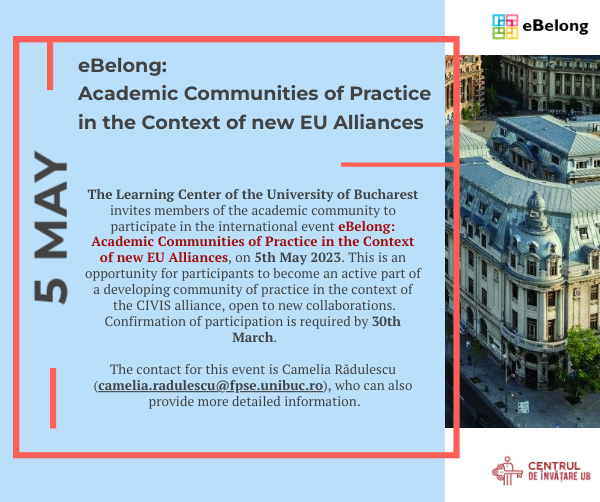eBELONG project creates a sense of belonging in online learning environments
eBelong: Sense of belonging in online learning environments is an Erasmus + project developed in 2021 to respond to the challenges imposed by the pandemic of Covid-19 in higher education institutions. Seven partners from across the CIVIS Alliance worked together sharing expertise and examples of good practices and researched more effective ways to facilitate learning in the “new reality”.
Despite the fact that universities managed rapidly to adapt practices by using existing digital tools and technological investments, the negative effects of students and scholars being isolated from the idly community, determined the focus on the necessity to take care of the social, emotional and affective side, as it impacted on the academic performance. The project also addressed issues related to equity, especially when it came to access learning experiences of the vulnerable groups: students with special education needs, socially-economically disadvantaged groups, etc, but also academics with reduced digital literacy and limited capacity to transfer all teaching in online environment in an effective way.
The project aimed to:
- IDENTIFY the best practices that could enhance teaching and learning when using digital tools and create conditions for social and emotional engagement of students in online learning.
- PROVIDE a framework for transforming and adapting learning support services, with a special focus on vulnerable groups.
- CREATE the tools to develop student’s sense of belonging in the context of virtual learning communities.
The target groups were the academics teaching online courses within the partner universities, all of which are CIVIS member universities. (Aix-Marseille Université, National and Kapodistrian University of Athens, University of Bucharest, Universidad Autónoma de Madrid, Sapienza Università di Roma, Stockholm University and University of Tübingen). There was a focus on those with reduced digital literacy and limited capacity to transfer all teaching in online environment in an effective way, and the students learning online, who needed to develop a sense of belonging, with a focus on those from vulnerable groups.
Collaborative groups of academics co-created knowledge on support mechanisms and services to be offered across all universities, starting with an analytical selection of the vulnerabilities in the education system, with a specific attention on the emotional and social impact of the pandemic and the identification of new categories of vulnerable people, a mapping of existing digital media used by partner universities for teaching and learning and an evaluation of their effect on sense of belonging, and approaching design thinking as a method to add knowledge about possibilities to enhance the sense of belonging among different categories of students in order to assist course design, support services and creation of digital tools.
By the end of the project all intellectual outputs and other tangible materials will be open access resources to be used, adapted and improved by partner universities and other organizations that seek to offer high quality online teaching practice and ensure social-emotional conditions of learning for their students at the same time.

As the project is approaching an end, we can conclude that a new mindset in HE, which focuses on social and emotional aspects of the learning experiences universities offer to their students in order to reach academic success, is required. Before looking at the excellence each study programme strives to offer in terms of academic teaching and learning, we need to consider the learning experiences of the students (their development as an individual, not only as a professional) as part of a community that fosters a sense of belonging (identification of common values, needs, purposes, visions for career/life), as well as the experiences of the academics who contribute to the creation and the mentainance of these communities of learning. Such communities act as an inexhaustive support resource, capable to respond to a diversity of needs, irrespective of the context, and at the same time very efficient in fostering social and emotional engagement with impact on learning productivity.
The conclusions of the project will be presented at an event organized in partnership with the Learning Center of the University of Bucharest on 5 May 2023, in which members of the academic community across Europe are invited to become an active part of a developing community of practice in the context of the CIVIS alliance, open to new collaborations. The event eBelong: Academic Communities of Practice in the Context of new EU Alliances introduces new perspectives on collaboration among HE institutions, the subject of new project applications.
